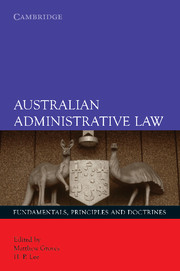Book contents
- Frontmatter
- Contents
- Foreword
- Preface
- About the contributors
- Table of cases
- Table of statutes
- 1 Australian administrative law: The constitutional and legal matrix
- 2 Administrative law in Australia: Themes and values
- 3 The public/private distinction in Australian administrative law
- 4 Australian administrative law: The human rights dimension
- 5 Administrative tribunals
- 6 Australian Ombudsman: A continual work in progress
- 7 Freedom of information
- 8 Delegated legislation
- 9 The concept of ‘justiciability’ in administrative law
- 10 Standing
- 11 Reasons for administrative decisions: Legal framework and reform
- 12 Relevant and irrelevant considerations
- 13 Improper purpose
- 14 Reasonableness, rationality and proportionality
- 15 The ‘no evidence’ rule
- 16 Failure to exercise discretion or perform duties
- 17 Procedural fairness: The hearing rule
- 18 The doctrine of substantive unfairness and the review of substantive legitimate expectations
- 19 The impact and significance of Teoh and Lam
- 20 The rule against bias
- 21 Jurisdictional error without the tears
- 22 Privative clauses and the limits of the law
- 23 Administrative law judicial remedies
- Endnotes
- Index
10 - Standing
Published online by Cambridge University Press: 05 June 2012
- Frontmatter
- Contents
- Foreword
- Preface
- About the contributors
- Table of cases
- Table of statutes
- 1 Australian administrative law: The constitutional and legal matrix
- 2 Administrative law in Australia: Themes and values
- 3 The public/private distinction in Australian administrative law
- 4 Australian administrative law: The human rights dimension
- 5 Administrative tribunals
- 6 Australian Ombudsman: A continual work in progress
- 7 Freedom of information
- 8 Delegated legislation
- 9 The concept of ‘justiciability’ in administrative law
- 10 Standing
- 11 Reasons for administrative decisions: Legal framework and reform
- 12 Relevant and irrelevant considerations
- 13 Improper purpose
- 14 Reasonableness, rationality and proportionality
- 15 The ‘no evidence’ rule
- 16 Failure to exercise discretion or perform duties
- 17 Procedural fairness: The hearing rule
- 18 The doctrine of substantive unfairness and the review of substantive legitimate expectations
- 19 The impact and significance of Teoh and Lam
- 20 The rule against bias
- 21 Jurisdictional error without the tears
- 22 Privative clauses and the limits of the law
- 23 Administrative law judicial remedies
- Endnotes
- Index
Summary
Standing has been described as a ‘metaphor to describe the interest required, apart from a cause of action as understood at common law, to obtain various common law, equitable and constitutional remedies’. A finding that a person lacks the requisite interest means that they are not entitled to an order in their favour even if they have otherwise shown that they would otherwise be entitled to orders in their favour.
The law which governs standing in public law cases is ‘far from coherent’. ‘The cases are infinitely various and so much depends in a given case on the nature of the relief which is sought, for what is sufficient in one case may be less than sufficient in another’. The law is complex, and reflects the semi-independent development of the different strands of law which make up Australian public law. The ‘rules’ governing standing vary, depending on whether the person seeking standing is an Attorney-General (Part 1); a person seeking an injunction, a declaration and, it seems, statutory orders of review (Part 2); an applicant for any of the public law writs of certiorari, prohibition, quo warranto and habeas corpus (Part 3); or an applicant for relief pursuant to a statutory scheme for judicial review or review on the merits (Part 4).
The standing of the Attorneys-General
Attorneys-General (whether state or federal) have a statutory right to intervene in matters arising under the Constitution or involving its interpretation.
- Type
- Chapter
- Information
- Australian Administrative LawFundamentals, Principles and Doctrines, pp. 158 - 171Publisher: Cambridge University PressPrint publication year: 2007
- 1
- Cited by



